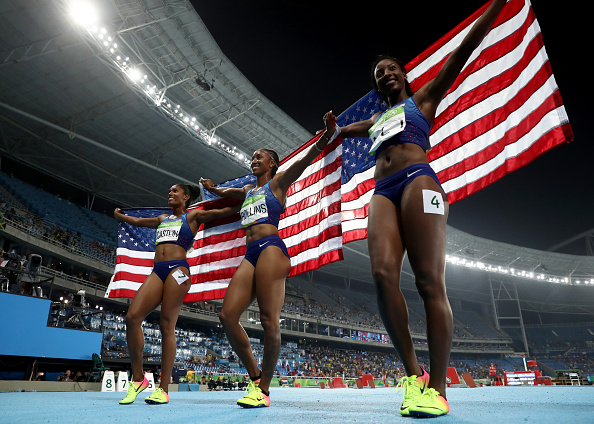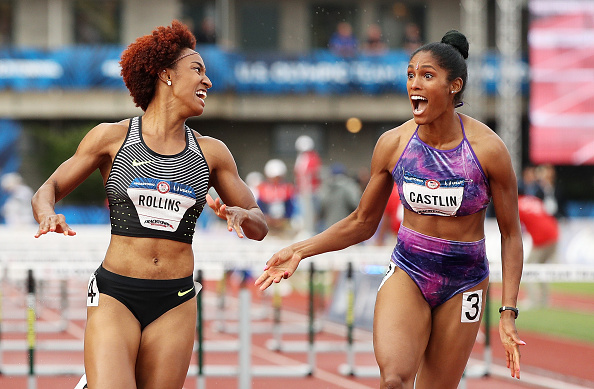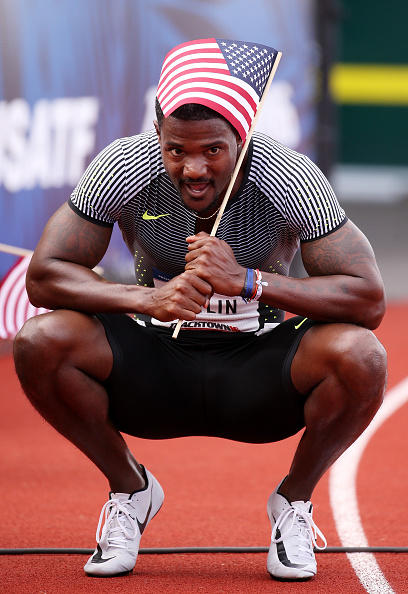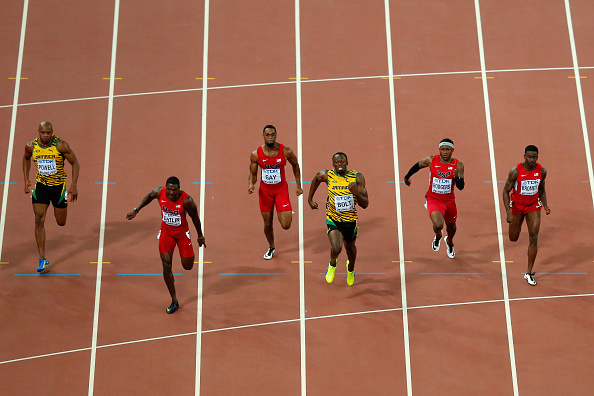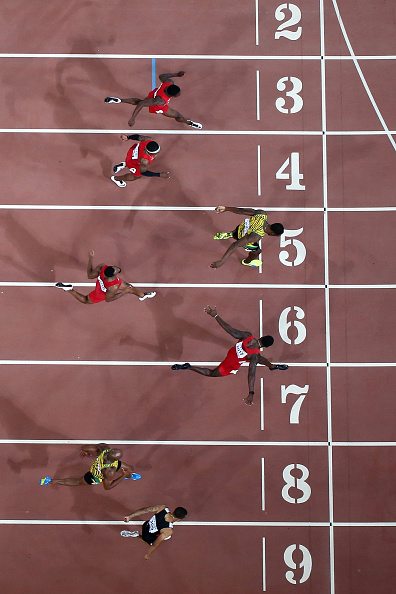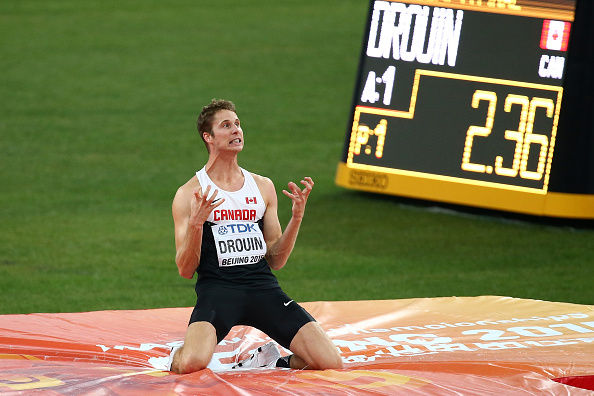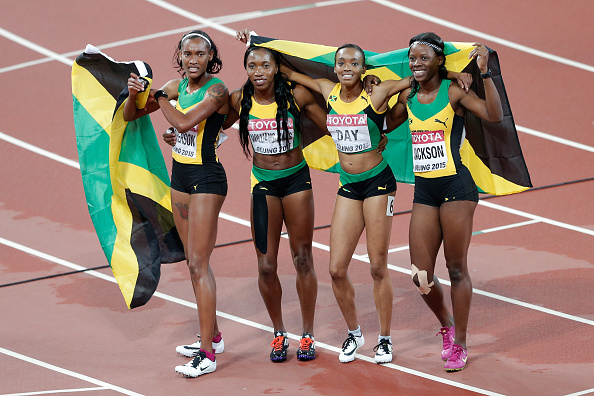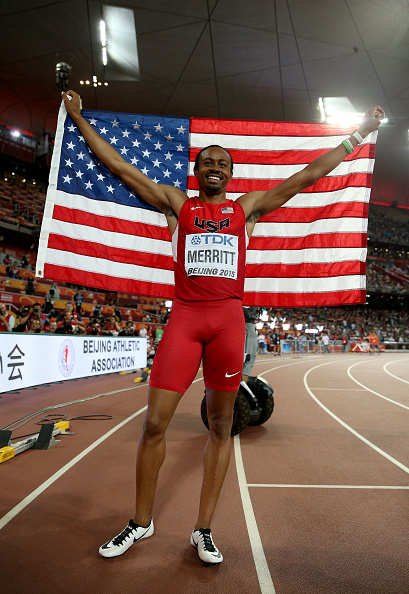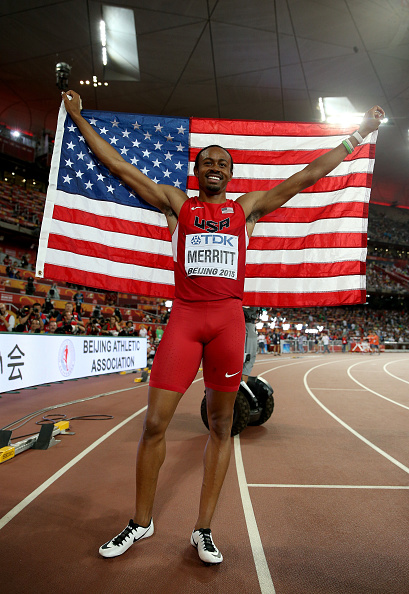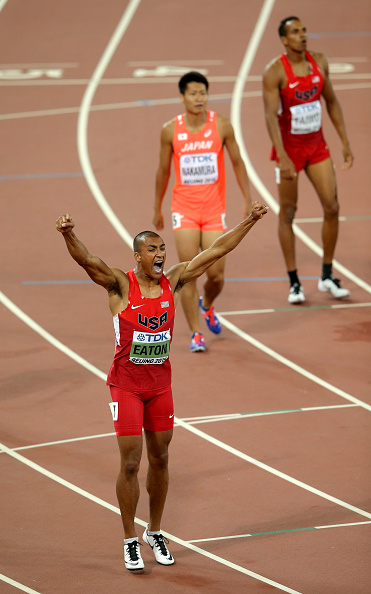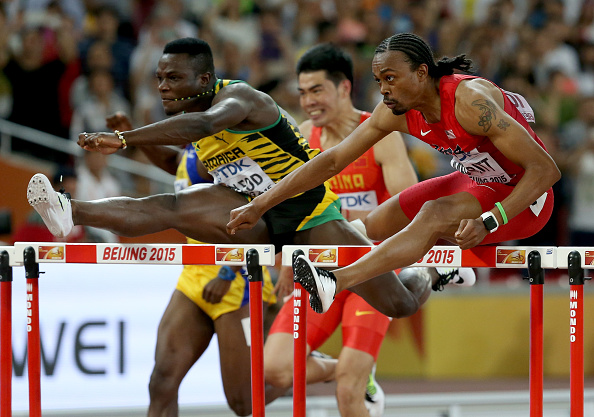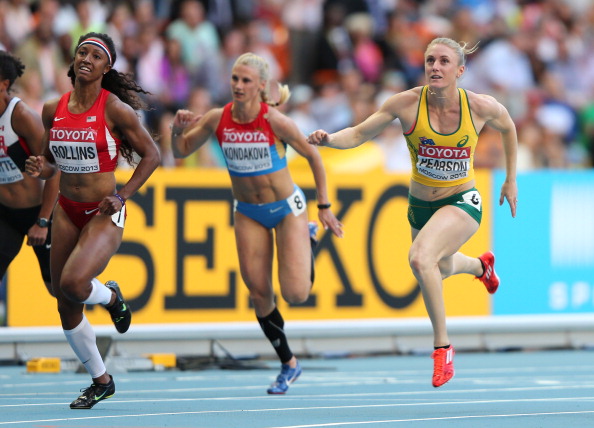EUGENE — Now we know exactly how many super-hard core track geeks there are in this little college town, the self-proclaimed track capital of the United States: 2900.
That’s how many people showed up Wednesday to watch the women’s hammer throw inside historic Hayward Field.
For the men’s hammer, later Wednesday, the crowd swelled to 4200.
Look, they tried. Again, the hammer throw took place inside Hayward. That’s called thinking out of the box.
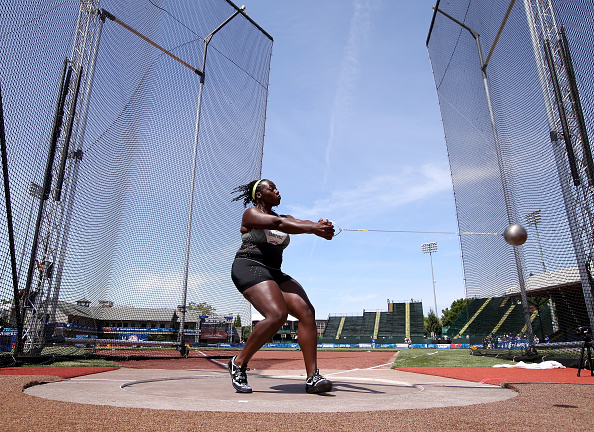
As these 2016 U.S. Olympic Trials move past the halfway mark, the meet — indeed, the experience — has by almost any measure not only met but surpassed expectations. Until a cloudy and then rainy Thursday, even the weather had cooperated — Oregon’s high blue skies providing a brilliant canopy for the tableau below, and performances like Justin Gatlin’s best-in-the-world-in-2016 9.80 seconds in the men’s 100 meters.
Even so, with the spotlight on for the second half of the meet, now is not the time to declare that all in the track and field universe is well.
Because these Trials, aiming toward the 2016 Olympics and beyond, to the 2021 world champioships back at a refurbished Hayward, are just the start.
Now is precisely the time, amid the glow of these Trials, to think about how — in the interest of making track and field that much more viable — to make the next editions of the Trials, in 2020 and 2024, that much more attractive.
For emphasis, these Trials have left little to be desired. Don’t have a ticket? Come watch on the big screen behind Hayward and listen to a live band. Not in Eugene and want to watch? Livestreams galore.
Even so, the U.S. track and field Trials could be so much more.
For starters, this meet not only could — but should — be six days, not 10.
For another, fairness and decency — along with TV appeal — demand a review of any number of standards, in particular field sizes and qualifying procedures, both for the Trials and the Olympics themselves.
Case in point:
Rudy Winkler, a 21-year-old college kid from Cornell who competes in Clark Kent-style glasses, won the men’s hammer, with a throw of 76.76, or 251-10. He does not know whether he will be invited to go to Rio. That’s not only counter-intuitive but insane.
The reason: the complexity of track and field’s rules. At the Games, there’s a field of 32, per the sport’s international governing body, the International Assn. of Athletics Federations. No American thrower, pre-Trials or at the meet, met the Olympic qualifying standard. Now Winkler, and the 2-3-4 finishers, must wait to see whether they get a Rio invite.
Another example:
In men’s javelin, both Cyrus Hostetler and Curtis Thompson broke the meet record in going 1-2. Hostler is Rio bound. Thompson — not.
Normally, of course, it’s top three.
But Thompson doesn’t have the Olympic qualifying standard, 83 meters, 272-3. He threw 82.88, 271-11, a lifetime best. And 12 centimeters short.
Riley Dolezal was third, 79.67, 261-4. Third is good. But not, in this instance, good enough for the Olympics.
Hostetler went 83.24, 273-1. So he’s good.
So is Sam Crouser, who took fourth, with 78.06, 256-1. He had the standard coming in.
Who else is good? Sean Furey, who took 11th, with 69.45, 227-10. That’s nearly 45 feet back. But Furey met the standard in June 2015.
So — first, fourth and 11th are en route to Rio.
How is any part of that supposed to make sense to the average person or the would-be fan?
A couple more examples:
But for a handful of athletes, the women’s hammer throw amounted essentially to an all-comers meet. That’s fine for an all-comers meet. But not the Trials.
On Thursday, they ran three first-round heats of the women’s 1500. This gets a little complicated.
There were three flights of 10. Three dropped out before the start, for various reasons — Kate Grace won the 800 and passed on the 1500, for instance. So 27 women raced for 24 spots in Friday’s semifinals. One of the three who ended up not making it: Sarah Brown, who gave birth just four months ago, seemingly her every move here being documented by a film crew.
A crash in the first heat knocked down Alexa Efraimson and Rachel Schneider. They got up and ended up qualifying on time, 4:14.4 and 4:22.94. Brenda Martinez, who got tangled up with Alysia Montaño in Monday’s 800 and didn’t make top-three in that event, won the second heat in 4:23. Then came the absurdity of the third round: 10 women, each of whom had run 4:10 or faster just to make the Trials, had to run just 4:22 to advance.
In sum — that third heat of 10 eliminated no one.
That’s beyond silly.
As for the three heats Monday in the women’s 3,000-meter steeplechase — after just two laps in each round, a sizable margin had opened up between the leaders and stragglers. Again, these are the Trials, supposed to be a test of the best.
What needs to be struck: the balance between the Trials between a culminating high-performance event and the kind of thing where people get to go home and say, I took part at the Trials.
The approriate revisions could, would, should and ought to bring all the drama of the Trials to the place it should be — the Trials.
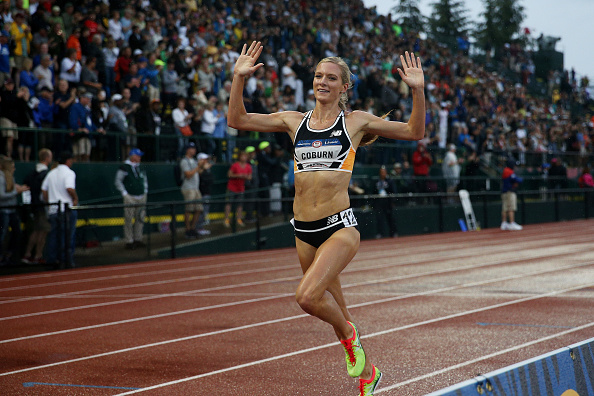
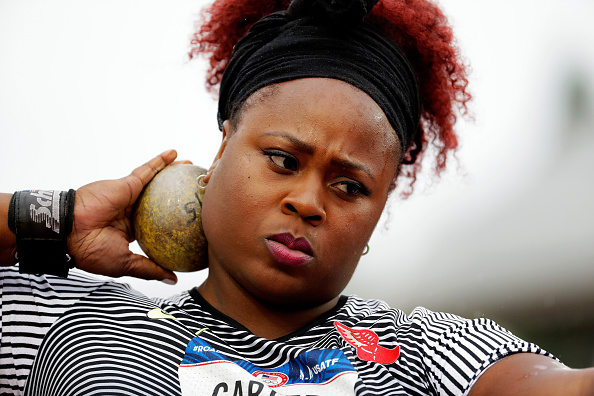
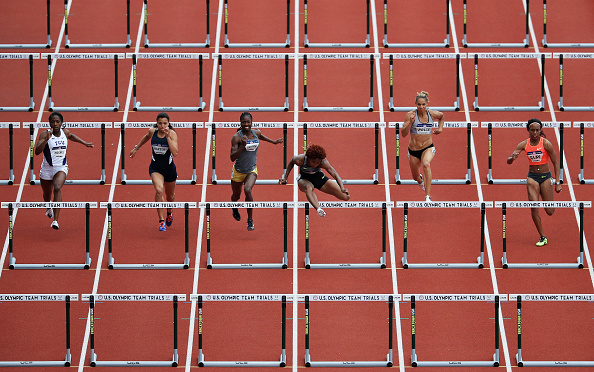
Like Thursday’s women’s steeple final. Emma Coburn won, in the sixth-fastest time ever, 9:17.48. At the bell lap, Stephanie Garcia had been second. She ended up tripping on the final barrier and finished fifth. Courtney Frerichs, 9:20.92, and Colleen Quigley, 9:21.29, went 2-3.
Like the women’s shot put earlier Thursday: Michelle Carter, one of the sport’s class acts, won on the final throw, 19.59 meters, 64 feet 3 1/4 inches, to qualify for her third Olympics.
Also Thursday, the heats in the women’s 100 hurdles. Coming into the U.S. Trials, 11 of the top 15 performers this year had been Americans. Keni Harrison, the American record holder (12.24 here in Eugene in late May), went 12.57 in the first heat. In the fifth, 2013 world champion Brianna Rollins, the former record holder (12.26, 2013 U.S. championships), went 12.56.
Whether the 2020 Trials are here in Eugene remains an open question. The 2000 and 2004 Trials were in Sacramento; the 2017 national champioships will be there, too. Even so, in preparation for 2021, the odds would have to favor being in Eugene in 2020 — just as in 2008 and 2012 as well.
For 2024, much depends on whether Los Angeles wins those 2024 Summer Games. The International Olympic Committee will pick the 2024 winner in September 2017 at a meeting in Lima, Peru. Also in the field: Paris, Rome and Budapest.
Looking ahead, the big-picture audience is not Eugene. Or, just to be obvious, those 2900 people.
The mission has to be how to grow track and field beyond the geeks.
This has been the avowed goal of both Max Siegel, chief executive of USA Track & Field, and Vin Lananna, president of the local Eugene organizing entity, called TrackTown, who is also head coach of the U.S. 2016 men’s track and field team.
As Lananna put it, it’s to “really grow the awareness of today’s track and field heroes” nationwide.
Siegel, in a news conference Tuesday, noted that when he took over four years ago, he had two overarching goals for USATF — organizational stability and driving innovation.
Stability: USATF’s annual budget is now $36 million, twice what it was four years ago.
Now it’s time to delve, big time, into the innovation.
Part of this involves changing the three-ring circus atmosphere that attends far too many meets, including the Trials.
On Thursday, for instance, the men’s triple jump prelims, with 2012 Olympic champion Christian Taylor, were being run at the same time as the heats — over on the track, literally a few feet to the right — of the women’s 100 hurdles. Same issue later Thursday: on the track, women’s 400 hurdles and, in the infield, men’s discus and run-throughs for the women’s triple jump.
Pick a day, almost any day, and it’s the same challenge: on Sunday, the men’s long jump competed for attention with the women’s high jump, featuring 32-year-old Chaunte Lowe and teen sensation Vashti Cunningham.
For the average fan, this presents a logical dilemma: where to look, and when?
Part of the solution: tighter scripting of the show flow. That's what this is. It's a show.
Part of it, too, involves reconfiguring the meet as entertainment. Again, that’s what it is. The purists are still going to show — how about a little 21st-century reach-out?
The swim Trials, just concluded in Omaha, featured fireworks, a waterfall, a sound-and-light show, individual athlete introductions, rock music and showtime bits on the big screen that the sold-out audience ate up — ongoing banter between pool-deck hosts (and former Olympic medalists) Brendan Hansen and Kaitlin Sandeno and, most nights, a crowd dance-off.
Here — brief athlete intros, yes. The rest? Why not?
At NFL games, there’s a flying camera. Here, no. Why not?
Track and field is statistics-heavy. Like football, baseball and, in the Olympic context, swimming. Yet at the swim Trials officials make readily available a day-of-event listing that provides individual athlete biographies as well as essentials such as records and Olympic histories.
The track Trials — no such thing. Why not?
Moreover, there is no iPhone or Google Play app that would make, say, such stats and results immediately availble to fans in the stands. Why not? It’s 2016, not 1972.
And then the production glitches that you’d think should be so obvious — at these Trials, the loud music from that soundstage frequently drowns out news conferences in the media tent just feet away. All sports, and particularly track and field, depend on story-telling. How to tell those stories when you can’t hear a word?
This problem was exactly the same in 2012. Complaints must have fallen on deaf ears. Maybe from that music.
For all these observations, the biggest thing that needs to be assessed is the length and scheduling of the meet.
This means both the daily and overall runs.
An evening at the swim Trials runs to two hours, maybe just a little more.
Consider Thursday’s Hayward schedule. It is profoundly unrealistic to expect the average fan — maybe with kids in tow, and track and field assuredly wants to reach out to young people — to show up at 3:30 p.m. and stay until roughly 8 p.m., when the women’s steeplechase wrapped up.
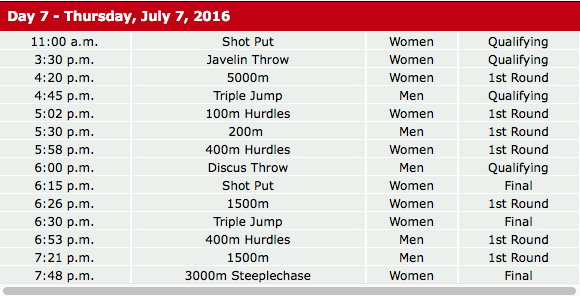
After nearly a week of brilliant weather, the rain arrived Thursday in Eugene. That didn’t help. But it rained during the 2012 Trials, too, and it’s simple common-sense that rain in Oregon is always a distinct possibility.
In non-Olympic years, meanwhile, the U.S. outdoor championship runs to only four days.
The Trials go on for 10, with a formal off-day in the middle.
If the reason for that is to benefit hotels, restaurants, bars and the Eugene Chamber of Commerce — that’s not a good reason. This is a track meet, not a convention.
If the idea is to mimic the Olympic schedule — the four-day meet produces world championship teams that win plenty of medals over the more-extended run.
These Trials started, sort of, last Thursday with a 20-kilometer walk in Salem, the state capital. The formal opening ceremony took place last Friday here at Hayward.
So: Friday, Saturday, Sunday, Monday.
Off-day Tuesday.
Wednesday: hammer throw, women’s and men’s.
Now the final four days: Thursday, Friday, Saturday and Sunday.
If four days is unrealistic for a Trials, there’s no good reason not to consider shrinking 10 days to six. Doing so would considerably reduce costs for virtually all stakeholders: athletes, fans, officials, the local organizing committee, USATF, TV, media and, not incidentally, law enforcement and security.
Six days is eminently do-able. Here is one plan of how it could work:
Day One and Two: 100, 400 as well as prelims in 800. The 10k could go on One, heats of the 5k on Two.
Day Three and Four: 400 final, 400 hurdles prelims, 200 prelims, 1500, 800 finals.
Day Five and Six: 200, 400 hurdles, 1500 and 5k finals.
Decathlon: Days One and Two. Heptathlon: Four and five.
Steeple: Days One and Three, Four and Six (men’s/women’s, or vice-versa).
Javelin: One and Three, Four and Six.
Discus: Two and Three, Four and Five.
Hammer: One and Two, Five and Six.
Triple jump: One and Two, Three and Four.
High jump: Two and Three, Five and Six.
Long jump: Three and Four, Five and Six.
Pole Vault: One and Two, Four and Five.
Shot put: Five.
This does not need to be rocket science. Track and field is a sleeping giant. But like most things, it would work better with a heaping dose of common sense.


